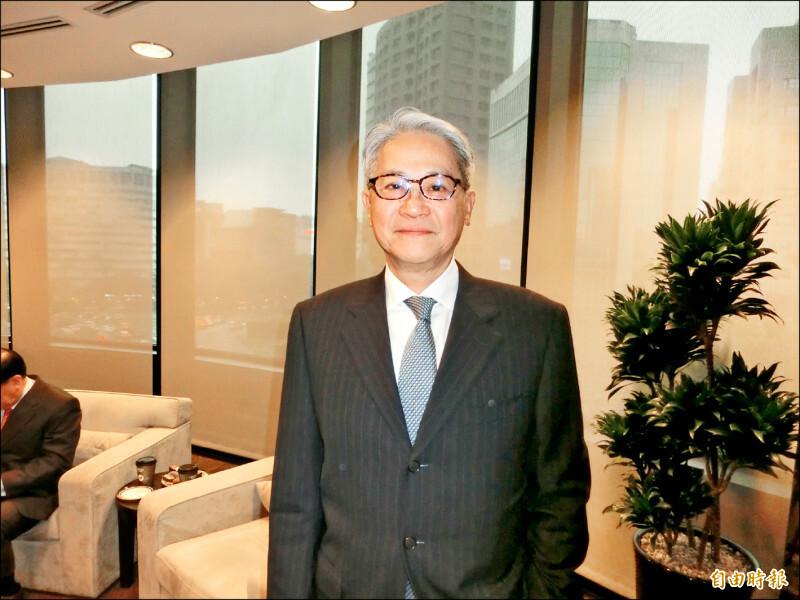The impact of US President Donald Trump’s 32-percent tax on goods from Taiwan, which was announced yesterday and is to be implemented next Wednesday, would “exceed expectations,” the Chinese National Association of Industry and Commerce (CNAIC) said in a statement this morning.
The CNIAC warned that the tariffs would pose significant challenges for Taiwan’s export-driven economy and recommended five immediate countermeasures.
The new tariff policy, announced yesterday, aims to “address the injustices of global trade, reshore manufacturing and drive economic growth for the American people," the White House said.

Photo: Taipei Times
Trump would impose "reciprocal tariffs" on US trading partners, with higher rates for countries with larger trade surpluses, including a tariff of 34 percent imposed on China and a 24-percent tariff for Japan.
The reciprocal tariffs do not include semiconductors, energy, pharmaceuticals and "certain minerals that are not available in the United States," according to a White House fact sheet.
Trump is, however, planning separate tariffs to target semiconductors, a White House official said.
The CNAIC suggested immediately activating crisis response measures, conducting a comprehensive review of the potential impacts and strengthening communication with the US.
It further proposed negotiating to lower the tariffs and providing tax relief and financial assistance to affected industries in Taiwan.
Taiwan was the US’ seventh-largest trading partner last year, according to an Executive Yuan trade report.
Taiwan plays a critical and strategic role in the US economy, producing 90 percent of the world’s advanced semiconductors, the American Chamber of Commerce in Taiwan (AmCham) said in a news release this morning.
US industries rely heavily on Taiwan for high-value, capital-intensive products that cannot be mass-produced elsewhere, such as semiconductors, information and communication technology (ICT) and precision machinery, AmCham said.
Moreover, Taiwan’s microchips significantly impact global supply chains and are essential to US industries from technology to cars; aerospace engineering to national defense, it said.
As both sides of the Pacific are facing an increasingly complex geopolitical landscape, the US and Taiwan should seek to strengthen existing economic and trade relations, it said.
In response to shifting global trends and industries, AmCham called for Washington and Taipei officials to continue to promote exchange and cooperation, to support industrial development, market stability, supply chain security and regional peace.
Furthermore, US exports to Taiwan have almost no domestic competition, with imported goods including agricultural products, aircraft and industrial machinery, AmCham said.
US-Taiwan investments have also been trending upwards, with Taiwan's cumulative direct investment in the US reaching US$17.1 billion in 2022, it added.
In the first 10 months of 2024, investments reached US$14 billion, accounting for 30.8 percent of Taiwan’s total outbound investments, it said.
Taiwan is also a critical source of capital in US financial markets, holding approximately US$256 billion in US Treasury securities as of January last year, ranking among the top ten foreign holders, it added.
Taiwan therefore stabilizes the US financial markets and plays an important role in the flow of US capital, it said.
Through continued investment in the US economy, Taiwanese businesses have contributed significantly to creating local jobs and stabilizing financial markets in the US, while making a significant contribution to supply chain resilience, it said.

‘DENIAL DEFENSE’: The US would increase its military presence with uncrewed ships, and submarines, while boosting defense in the Indo-Pacific, a Pete Hegseth memo said The US is reorienting its military strategy to focus primarily on deterring a potential Chinese invasion of Taiwan, a memo signed by US Secretary of Defense Pete Hegseth showed. The memo also called on Taiwan to increase its defense spending. The document, known as the “Interim National Defense Strategic Guidance,” was distributed this month and detailed the national defense plans of US President Donald Trump’s administration, an article in the Washington Post said on Saturday. It outlines how the US can prepare for a potential war with China and defend itself from threats in the “near abroad,” including Greenland and the Panama

The Chinese Nationalist Party (KMT) is maintaining close ties with Beijing, the Democratic Progressive Party (DPP) said yesterday, hours after a new round of Chinese military drills in the Taiwan Strait began. Political parties in a democracy have a responsibility to be loyal to the nation and defend its sovereignty, DPP spokesman Justin Wu (吳崢) told a news conference in Taipei. His comments came hours after Beijing announced via Chinese state media that the Chinese People’s Liberation Army’s Eastern Theater Command was holding large-scale drills simulating a multi-pronged attack on Taiwan. Contrary to the KMT’s claims that it is staunchly anti-communist, KMT Deputy

RESPONSE: The government would investigate incidents of Taiwanese entertainers in China promoting CCP propaganda online in contravention of the law, the source said Taiwanese entertainers living in China who are found to have contravened cross-strait regulations or collaborated with the Chinese Communist Party (CCP) could be subject to fines, a source said on Sunday. Several Taiwanese entertainers have posted on the social media platform Sina Weibo saying that Taiwan “must be returned” to China, and sharing news articles from Chinese state media. In response, the Mainland Affairs Council (MAC) has asked the Ministry of Culture to investigate whether the entertainers had contravened any laws, and asked for them to be questioned upon their return to Taiwan, an official familiar with the matter said. To curb repeated

Myanmar has turned down an offer of assistance from Taiwanese search-and-rescue teams after a magnitude 7.7 earthquake struck the nation on Friday last week, saying other international aid is sufficient, the National Fire Agency said yesterday. More than 1,700 have been killed and 3,400 injured in the quake that struck near the central Myanmar city of Mandalay early on Friday afternoon, followed minutes later by a magnitude 6.7 aftershock. Worldwide, 13 international search-and-rescue teams have been deployed, with another 13 teams mobilizing, the agency said. Taiwan’s search-and-rescue teams were on standby, but have since been told to stand down, as